From self-driving cars, robotics, factory automation, AI-powered E-commerce store, virtual travel
assistants to faster drug discovery and diagnosis in the healthcare sector, AI is changing people’s lives
in every possible way. The manufacturing sector is ahead of every other industry in the application of
artificial intelligence. Manufacturers have AI-powered their engineering processes to improve the quality
of the product, its efficiency and also have reduced the time taken to finish production or a process.
Here are some of the ways in which AI helps with the growth trajectory of the manufacturing sector.
Manufacturing Automation through AI

Maintenance of systems and processes has been a high-cost item for manufacturers worldwide. Predictive
maintenance is a low hanging fruit that promises to reduce the cost of manufacturing significantly. The
optimal conditions for equipment, systems, and processes are defined to predict the possibilities of
failure of the need for maintenance. Machine learning is used to identify patterns in predictions and fix
the root causes of issues. This will prevent unplanned downtime costs as well as failure/losses.
Predictive maintenance helps in predicting the next failure of a machine or a system. It makes use of
advanced AI algorithms in machine learning to predict any malfunctions that are likely to occur in a
process. Companies like Texmark Chemicals, Lockheed Martin, Deutsche Bahn railway operations and
Thyssenkrupp are some of the companies that have incorporated and enabled predictive analysis.
Automating the manufacturing sector has also allowed improving the standards and quality of the product.
The production time-to-market deadlines have shortened and at the same time, the demand for the rise in
quality hasn’t been compromised. This has made it difficult for manufacturers to meet increasing deadlines
and demands. Customer expectations have also increased, which has pushed the needs for increasing the
quality of the products. Luckily, there’s AI to help here as well.
Case in point, a robotic prototype is being used to follow CAD instructions to design and build parts! It
reads and interprets the CAD instructions in order to build parts without the need for programming. The
use of AI reduces the workload on humans by half. Factories employ several numbers of people to detect and
inspect any defects. With the deep-learning algorithms that are backed by AI, it just requires less than a
second to locate any defect, a hundred times more accurate than humans.
AI is revolutionizing the manufacturing sector as its complex algorithms notify the manufactures about any
fault in the products and measures are taken immediately to rectify them. Some of these faults could be
slight deviations in the machine behaviour, issues in raw materials, etc. By being aware of these issues
at an early stage, the manufacturers maintain the quality of the product. Further, after the product is
out and about in the field, the manufacturers can keep a tab on their performance, which helps them in
making useful decisions regarding its engineering and design. This helps in maintaining the quality of the
products apart from delivering it on time.
The products now are undergoing an efficient design process when compared to the past. The designs readied
by the engineers and designers are provided as an input into an algorithm, powered by AI. This software
which is referred to as generative design software receives input that includes data which describes
various parameters as well as the restrictions of the material, the production methods that are available,
time restrictions as well as budget issues. This will help in analysing the restrictions as well as other
complexities involved in the design. The algorithm also proposes solutions that can be tested using
machine learning and can be tried several times before an optimal design is reached.
Today’s manufacturing market is continuously changing and evolving based on current needs and trends. AI
algorithms help the manufacturing industries anticipate the changes in the market, estimate market demands
and help manufacturers optimize the needs of raw material, staffing, consumption of energy as well as
inventory control.
When it comes to the application of AI in manufacturing, the tide is definitely shifting. AXISCADES has
decades of experience in manufacturing. We spearhead the collection, analysis, and use of active data that
will help in building a smart ecosystem that effectively converts data using artificial intelligence. Read
more about our offering here.













